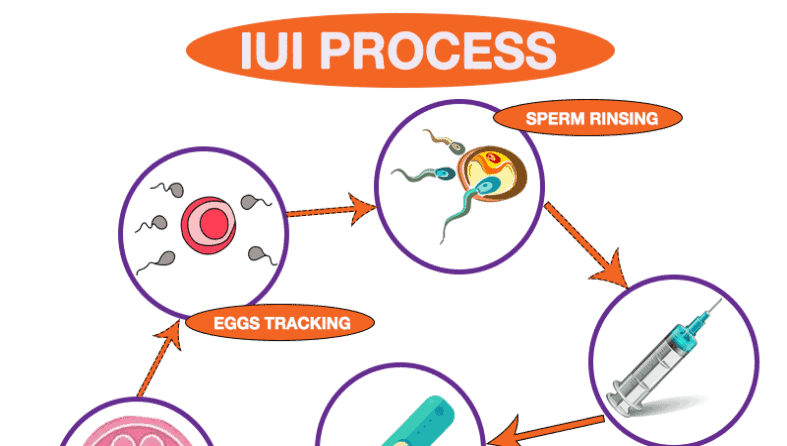IUI Treatment: What Exactly is IUI?
IUI, IVF
With the changing lifestyle preferences, the problems associated with infertility have been on the rise. Infertility has been affecting around 15% of reproductive-aged couples all around the world. With such a huge percentage of couples struggle with fertility issues, many have been turning to infertility treatments like artificial insemination to conceive.
But before you decide to opt for a treatment, it is essential to empower yourselves with the various options you have, how each of it works and which could suit you well. It is important to trust your doctor, yes, but that doesn’t mean that you shouldn’t be equipped on your own.
One such commonly preferred artificial insemination technique by couples is Intrauterine Insemination (IUI). In this post, we will be seeing in detail about the IUI procedure which was researched and collected from the industry experts.
What Exactly Is IUI?
IUI is performed by collecting the partner’s sperm or a donor’s sperm and placing it inside the uterus of a woman to increase the chances of fertilization. The sperm of a man is collected and is put through the process of ‘sperm washing’. By sperm washing, the swimming sperm is separated from the non-swimming ones and all the undesirable matter are removed. This swimming sperm is now placed in a woman’s uterus and closer to the fallopian tubes using a catheter around the time of ovulation.
Types of IUI
There are two types of IUI: the natural IUI and the medicated IUI. While fertility drugs are given for medicated IUI to produce more eggs to increase the chances of fertilization, natural IUI does not involve any medications.
How Is IUI Procedure Performed?
IUI procedure starts with collecting your blood samples and undergoing an ultrasound test to check your condition. If everything looks good, your IUI will be scheduled just before you start ovulating.
Before inseminating the uterus with the sperm, you will be administered hCG shots, generally 24 hours before the procedure, to increase the chances of insemination.
On the day of the process, the sperm will be prepared and chosen by sperm washing process. A catheter containing your sperm will then be placed inside your uterus through the cervix. Generally, you will be asked to lie horizontally for a few minutes after the procedure is performed.
And then, it is done! Be patient for two weeks and wait for the sperm to the do its job!
After 2 weeks, you will be asked to take a pregnancy test at home or you can have a checkup at the hospital too to see if the procedure has been fruitful.
When Can IUI Help You To Conceive?
IUI works in cases when women have the following medical conditions:
- Unexplained infertility issues
- Hostile cervical problems
- A cervical scar that blocks the passage of sperm
- PCOS , after it is treated with medication
- Thick cervical mucus
Or, when your male partner has:
- Low sperm motility
- Low sperm count
- Ejaculation problems
- Impotence
Or, in cases of same-sex couples.
When To Opt For IUI Treatment?
Since this a non-invasive procedure, IUI is generally recommended first before proceeding to explore other methods of artificial insemination.
IUI is generally opted when the sperm cannot go through the cervix of a woman for any reason. So, in cases of low sperm count or problems with sperm mobility, this procedure directly introduces the best sperm inside the uterus, thus increasing the probability of pregnancy. Also, this can be used with women who have semen allergy, unexplained infertility issues or a cervical mucus problem.
In general, IUI can be beneficial in cases where the sperm needs a little nudge to fertilize the egg, or when the uterus is made ready to accept the sperm without damaging it.
Want To Book A Free Consultation
When IUI Treatment Doesn’t Work
IUI cannot be performed on:
- Women with severe endometriosis
- Women with pelvic adhesions
- Blocked fallopian tubes
- Previous pelvic infections
IUI Treatment Cost
The cost of IUI is lesser when compared to other insemination techniques like IVF.
The typical cost of IUI procedures in India is between Rs.4,000 to Rs. 15,000 depending on the place you are in, your age and your medical health. But comparatively, the success rate of IUI is lower.
IUI Success Rate In India
For a woman below the age of 35, the chances of pregnancy are 10% to 20%, while for a woman between the age of 35 and 40, the chances are 10%. For women above the age of 40%, the chances reduce to 5%. The success rate of IUI is lesser than the success rate of IVF.
Read More: The Basic Guide to IVF in India
The more cycles of IUI you undergo, the more the chances of you getting pregnant. Generally, it is recommended to try IUI for six cycles before switching to other treatments.
While the cost is affordable, the success rate depends on various factors. It is better to start with IUI for a few cycles and see if it fetches any results because IUI costs lesser and has a simple non-invasive procedure when compared to IVF.
To know about few ivf test click
FAQs on IUI Treatment
1. Is there a specific sperm count needed to perform IUI?
While a minimum sperm count of 1 million is seen as the limit, it is recommended to have a sperm count of at least 5 million. Higher sperm count will increase the chances of fertilization.
2. Will I feel pain during the IUI procedure?
As we discussed earlier, IUI is a non-invasive treatment. Through you may feel a little uncomfortable when the catheter is inserted into your uterus, you wouldn’t be feeling any pain.
3. Are there any side effects to IUI?
While a few women may get minor cramps, or experience bleeding after the procedure, this is not common among all women.
4. Are there any risks associated?
It is also important to conduct a clean procedure as there may be possibilities of infection if the sperm is not screened properly. When you are using a donor, it is essential to stress the importance of checking the sperms for any kind of infections before introducing it into the uterus.
5. Can we have sex after the IUI procedure?
Yes, you can. Although some advice to refrain from sex for 2 to 3 days before the procedure if the male is contributing the sperm. This helps in increasing the sperm count and volume. If you have any other reproductive problems, it is best to check with the doctor to see if you can have sex.
6. Do I have to lie down after the IUI procedure?
Your cervix doesn’t remain open after introducing the sperm hence there is no harm is acting normal. Some doctors may advise lying down for a few minutes.
7. I feel wetter after IUI. Does that mean the sperm is coming out?
Generally, after the IUI procedure, the cervical mucus is loosened and it comes out easily. This makes you feel wetter.
8. Should I not be doing any hard work after IUI?
It isn’t a necessity to go soft but some women reduce the amount of heavy lifting and high exertion works to let the sperm do its job easily.
9. Will I get pregnant with IUI?
There is no surety that you will get pregnant with IUI treatment. But undergoing one cycle of IUI increases your chances of getting pregnant by 5% to 20%. You can opt for multiple cycles which will further increase the chances of you getting pregnant.
10. What to do when IUI fails?
After the recommended cycles of IUI treatment fails, then the next option that is generally recommended by doctors is IVF.
Want To Book A Free Consultation
Have you undergone IUI before? Do you have any experiences with IUI treatment you would like to add? If you had a successful pregnancy with IUI treatment do let us know in the comment below and motivate other couples reading it.






Your Comment Is Valuable For Us
Thanks For Your Feedback.